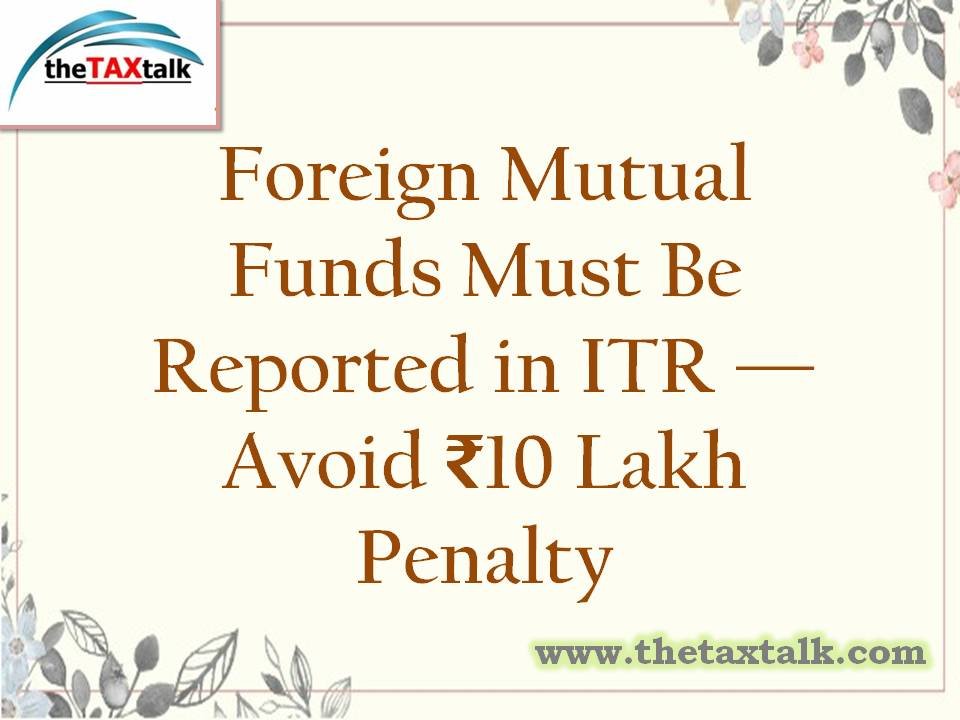![]()
Foreign Mutual Funds Must Be Reported in ITR — Avoid ₹10 Lakh Penalty
As more Indian taxpayers explore global investment opportunities, a crucial compliance requirement is often overlooked — the mandatory reporting of foreign mutual funds and other overseas assets in the Income Tax Return (ITR). Many fail to realize that even dormant or low-value foreign holdings can attract steep penalties if not properly disclosed.
Let’s break down what needs to be done to stay compliant — and avoid unnecessary trouble.
Who Must Report Foreign Assets?
If you’re classified as a Resident and Ordinarily Resident (ROR) under Indian tax laws, you are required to report all foreign assets and income in your ITR. This includes:
• Mutual fund investments abroad
• Foreign bank accounts
• Retirement accounts or pensions held overseas
• Property or shares held outside India
• Trusts or insurance policies abroad
To qualify as an ROR, you must satisfy specific stay conditions in India during the financial year and the preceding years. If you do, your global income becomes taxable in India and mandatory to disclose, even if it’s exempt or tax-paid abroad.
Where and How to Disclose in the ITR
Foreign assets and income are to be reported in Schedule FA (Foreign Assets) of the applicable ITR forms — such as ITR-2 or ITR-3. This schedule requires detailed reporting, including:
• Type and location of the asset
• Country of incorporation
• Peak balance/value during the year
• Date of acquisition
• Income generated from the asset
For accurate reporting, any foreign currency value must be converted into INR using the telegraphic transfer buying rate of the Reserve Bank of India (RBI) as on the last day of the financial year.
Foreign Tax Paid? Claim Tax Credit
If you’ve paid tax abroad on the income earned from foreign mutual funds or other assets, you can claim relief in India through the Foreign Tax Credit (FTC) mechanism.
To do this:
1. File Form 67before submitting your ITR.
2. Keep documentary proof of tax paid abroad — such as tax slips or returns.
3. Make sure to match the income reported with the foreign tax credit claimed.
This helps avoid double taxation and ensures compliance with the provisions of the Double Taxation Avoidance Agreement (DTAA) that India has with several countries.
Penalties for Non-Disclosure Are Heavy
Failure to report foreign assets can have serious consequences. Under the Black Money (Undisclosed Foreign Income and Assets) Act, a penalty of ₹10 lakh per asset per year can be levied for nondisclosure — even if the asset did not earn any income during the year.
This penalty is separate from those under the Income Tax Act, which can include additional fines for misreporting or concealment under Sections like 270A or 271.
Common Mistakes to Avoid
Many taxpayers assume they don’t need to report foreign investments if:
• The asset earned no income
• The value is small or dormant
• Tax has already been paid abroad
• The asset was inherited or jointly held
These assumptions are incorrect. The law requires complete disclosure of foreign holdings irrespective of income, usage, or ownership share. Even if no tax is payable, disclosure is still mandatory.
Key Takeaways
If you’re an ROR, disclose all global assets in your ITR.
Use the correct exchange rate (TT buying rate as on March 31).
Claim FTC properly using Form 67.
Don’t ignore foreign mutual funds, even if held via fintech apps or platforms.
Penalties for nondisclosure are severe — better to report and clarify than to hide and suffer later.
Conclusion
Foreign investments may offer great returns, but they also come with tax responsibilities. The Income Tax Department is actively using data sharing arrangements and AI-driven analytics to track global assets held by Indian residents.
Whether your foreign mutual fund investment was made last year or several years ago, the right time to report it is now — not when a notice arrives.
Being proactive with your tax compliance ensures peace of mind and keeps you on the right side of the law.


